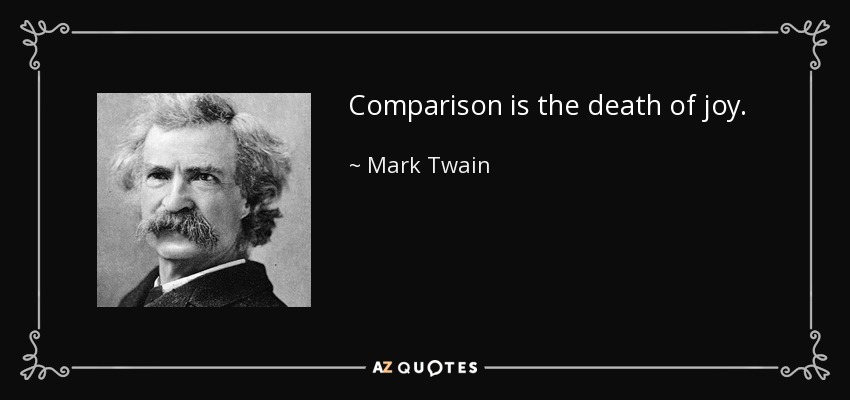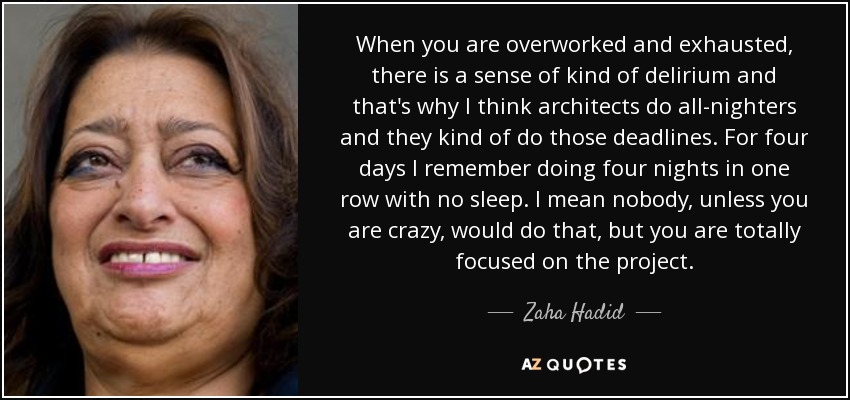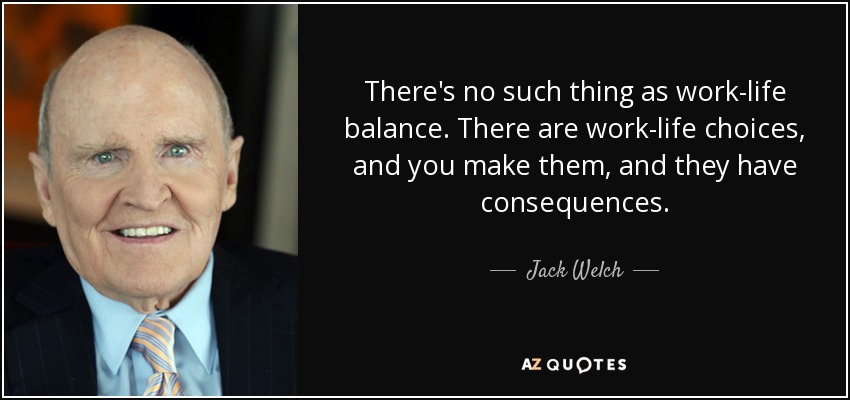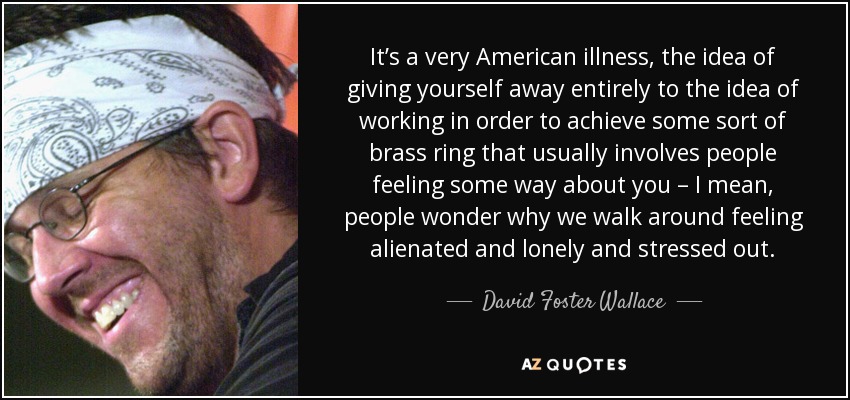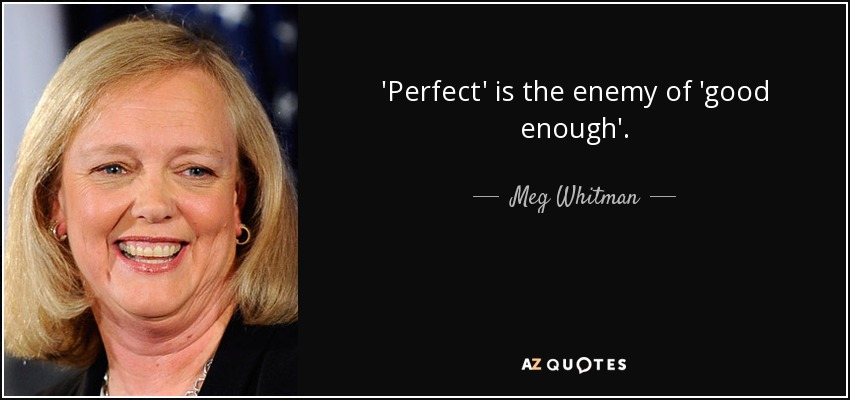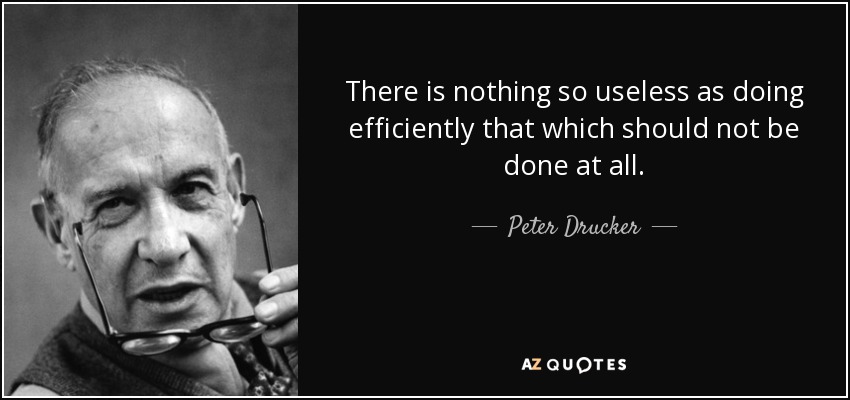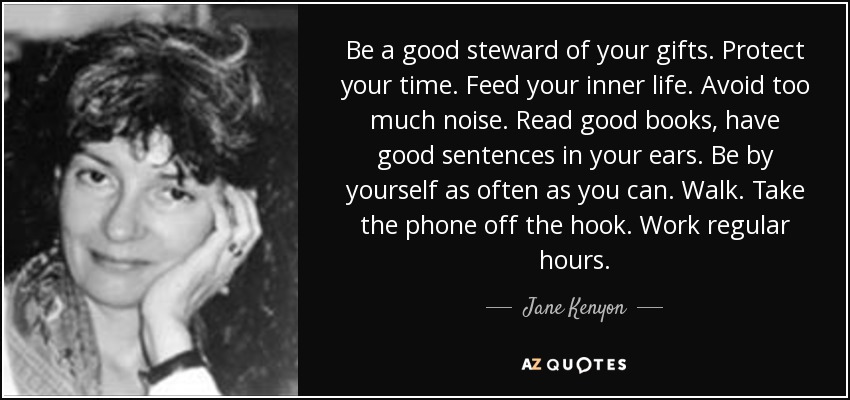Click here to return to Blog Post Intro
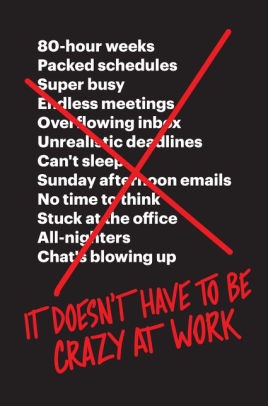
Jason Fried (CEO) and David Heinemeier Hansson (Chief Technology Officer) founded Basecamp in 2003—a unique cloud-based application that helps companies organize all their projects and internal communications in one place. Their book describes choices they made to design a different company.
Your Company Is a Product
Yes, the things you make are products (or services), but your company is the thing that makes those things. That’s why your company should be your best product.
When you think of the company as a product, you ask different questions:
- Do people who work here know how to use the company?
- Is it simple? Complex?
- Is it obvious how it works?
- What’s fast about it?
- What’s slow about it?
- Are there bugs?
- What’s broken that we can fix quickly and what’s going to take a long time?
People often toss a version number at the end of software (e.g., iOS 10.1, 10.2, 10.5, etc.). Today’s Basecamp is like version 50.3. We got here by going there, trying that, and figuring out what works best.
Curb Your Ambition
You have to recognize that “It’s crazy at work” isn’t right. Calm is a destination and we’ll share with you how we got there and stay there.
Bury the Hustle
The hustle may have started as a beacon for those with little to outsmart those with a lot, but now it’s just synonymous with the grind.
You’re not very likely to find that key insight or breakthrough idea north of the 14th hour in the day. Creativity, progress, and impact do not yield to brute force.
Bury the hustle. Put in a good day’s work, day after day, but nothing more.
Happy Pacifists
What’s our market share? We don’t know, don’t care. It’s irrelevant. Do we have enough customers paying us enough money to cover our costs and generate a profit? Yes. Is that number increasing every year? Yes. That’s good enough for us. Doesn’t matter if we’re 2 percent of the market or 4 percent or 75 percent. What matters is that we have a healthy business with sound economics that work for us. Costs under control, profitable sales.
We’re with Mark. We don’t compare. What others do has no bearing on what we’re able to do, what we want to do, or what we choose to do.
Our Goal: No Goals
The wisdom of setting business goals—always striving for bigger and better—is so established that it seems like the only thing left to debate is whether the goals are ambitious enough. So imagine the response when we tell people that we don’t do goals. At all.
This anti-goal mindset definitely makes Basecamp an outcast in the business world.
We don’t mind leaving some money on the table and we don’t need to squeeze every drop out of the lemon. Those final drops usually taste sour, anyway.
Let’s face it: Goals are fake. Nearly all of them are artificial targets set for the sake of setting targets. These made-up numbers then function as a source of unnecessary stress until they’re either achieved or abandoned.
Chasing goals often leads companies to compromise their morals, honesty, and integrity to reach those fake numbers. The best intentions slip when you’re behind.
How about something really audacious: No targets, no goals? You can absolutely run a great business without a single goal. You don’t need something fake to do something real.
Don’t Change the World
Everyone wants to be a disrupter these days. Break all the rules (and several laws). Upend every existing industry. If you stop thinking that you must change the world, you lift a tremendous burden off yourself and the people around you.
Set out to do good work. Set out to be fair in your dealings with customers, employees, and reality. Leave a lasting impression with the people you touch and worry less (or not at all!) about changing the world.
Make It Up as You Go
We didn’t start the business with a plan, and we don’t run the business by a plan. For nearly 20 years, we’ve been figuring it out as we go, a few weeks at a time.
When you stick with planning for the short term, you get to change your mind often. And that’s a huge relief!
Furthermore, long-term planning instills a false sense of security. The sooner you admit you have no idea what the world will look like in five years, three years, or even one year, the sooner you’ll be able to move forward without the fear of making the wrong big decision years in advance. Nothing looms when you don’t make predictions.
Comfy’s Cool
The idea that you have to constantly push yourself out of your comfort zone is the kind of supposedly self-evident nonsense you’ll often find in corporate manifestos.
Requiring discomfort—or pain—to make progress is faulty logic. While “No Pain, No Gain!” looks good on a poster at the gym, work and working out aren’t the same.
Most of the time, if you’re uncomfortable with something, it’s because it isn’t right. Discomfort is the human response to a questionable or bad situation, whether that’s working long hours with no end in sight, exaggerating your business numbers to impress investors, or selling intimate user data to advertisers. If you get into the habit of suppressing all discomfort, you’re going to lose yourself, your manners, and your morals.
Defend Your Time
8’s Enough, 40’s Plenty
Working 40 hours a week is plenty. Plenty of time to do great work, plenty of time to be competitive, plenty of time to get the important stuff done.
No all-nighters, no weekends, no “We’re in a crunch so we’ve got to pull 70 or 80 hours this week.” Nope.
If you can’t fit everything you want to do within 40 hours per week, you need to get better at picking what to do, not work longer hours. Most of what we think we have to do, we don’t have to do at all. It’s a choice, and often it’s a poor one.
Protectionism
Companies love to protect, but all too often they fail to protect what’s both most vulnerable and most precious: their employees’ time and attention.
Rather than regular staff meetings, we ask people to write updates daily or weekly on Basecamp for others to read when they have a free moment. This saves dozens of hours a week and affords people larger blocks of uninterrupted time. Meetings tend to break time into “before” and “after.” Get rid of those meetings and people suddenly have a good stretch of time to immerse themselves in their work.
Time and attention are best spent in large bills, if you will, not spare coins and small change.
The Quality of an Hour
A fractured hour isn’t really an hour—it’s a mess of minutes.
It’s hard to be effective with fractured hours, but it’s easy to be stressed out: 25 minutes on a phone call, then 10 minutes with a colleague who taps you on the shoulder, then 5 on this thing you’re supposed to be working on, before another 15 are burned on a conversation you got pulled into that really didn’t require your attention. Then you’re left with 5 more to do what you wanted to do. No wonder people who work like that can be short- or ill-tempered.
Ask yourself: When was the last time you had three or even four completely uninterrupted hours to yourself and your work? When we recently asked a crowd of 600 people at a conference that question, barely 30 hands went up.
Effective > Productive
Productivity is for machines, not for people. There’s nothing meaningful about packing some number of work units into some amount of time or squeezing more into less. Machines can work 24/7, humans can’t.
We don’t believe in busyness at Basecamp. We believe in effectiveness.
Being productive is about occupying your time—filling your schedule to the brim and getting as much done as you can. Being effective is about finding more of your time unoccupied and open for other things besides work.
The Outwork Myth
Assuming you can work harder and longer than someone else is giving yourself too much credit for your effort and not enough for theirs. Putting in 1,001 hours to someone else’s 1,000 isn’t going to tip the scale in your favor.
A great work ethic isn’t about working whenever you’re called upon. It’s about doing what you say you’re going to do, putting in a fair day’s work, respecting the work, respecting the customer, respecting coworkers, not wasting time, not creating unnecessary work for other people, and not being a bottleneck. Work ethic is about being a fundamentally good person that others can count on and enjoy working with.
Stop equating work ethic with excessive work hours. Neither is going to get you ahead or help you find calm.
Work Doesn’t Happen at Work
Ask people where they go when they really need to get something done. One answer you’ll rarely hear: the office. Way too many people simply can’t get work done at work anymore. It doesn’t make any sense.
Modern-day offices have become interruption factories.
People aren’t working longer and later because there’s more work to do all of a sudden. People are working longer and later because they can’t get work done at work anymore!
Office Hours
We borrowed an idea from academia: office hours. All subject-matter experts at Basecamp now publish office hours. For some that means an open afternoon every Tuesday. For others it might be one hour a day. It’s up to each expert to decide their availability.
What if you have a question on Monday and someone’s office hours aren’t until Thursday? You wait, that’s what you do. You work on something else until Thursday, or you figure it out for yourself before Thursday. Just like you would if you had to wait to talk to your professor.
It turns out that waiting is no big deal most of the time. But the time and control regained by our experts is a huge deal. Calmer days, longer stretches of uninterrupted time to get things done, and planned moments when they can enter a more professorial mode and teach, help, and share.
Calendar Tetris
The shared work calendar is one of the most destructive inventions of modern times.
You can’t just reach into someone’s calendar, find an open slot, and plant your flag. That’s because no one can see anyone else’s calendar at Basecamp.
In most places, everyone can see everyone else’s day. People’s calendars are not only completely transparent, they are optimized to be filled in by anyone who simply feels like it.
Taking someone’s time should be difficult. Taking many people’s time should be so cumbersome that most people won’t even bother to try it unless it’s really important! Meetings should be a last resort, especially big ones.
The Presence Prison
We don’t require anyone to broadcast their whereabouts or availability at Basecamp. No butts-in-seats requirement for people at the office, no virtual-status indicator when they’re working remotely.
“How do you know if someone’s working if you can’t see them?” Same answer as this question: “How do you know if someone’s working if you can see them?” You don’t. The only way to know if work is getting done is by looking at the actual work. That’s the boss’s job. If they can’t do that job, they should find another one.
Take a step toward calm, and relieve people from needing to broadcast their whereabouts and status.
I’ll Get Back to You Whenever
The expectation of an immediate response is the ember that ignites so many fires at work. In almost every situation, the expectation of an immediate response is an unreasonable expectation.
The common thinking goes like this: If I can write you quickly, you can get back to me quickly, right? Technically, right. Practically, wrong.
Almost everything can wait. And almost everything should.
At Basecamp, we’ve tried to create a culture of eventual response rather than immediate response.
FOMO? JOMO!
FOMO. The fear of missing out. It’s the affliction that drives obsessive checking of Twitter feeds, Facebook updates, Instagram stories, WhatsApp groups, and news apps. As if email wasn’t bad enough at cultivating FOMO, we now have a new generation of real-time tools like chat to stoke it.
Most people should miss out on most things most of the time. That’s what we try to encourage at Basecamp. JOMO! The joy of missing out.
One way we push back against this at Basecamp is by writing monthly “Heartbeats.” Summaries of the work and progress that’s been done and had by a team, written by the team lead, to the entire company. All the minutiae boiled down to the essential points others would care to know. Just enough to keep someone in the loop without having to internalize dozens of details that don’t matter.
Feed Your Culture
We’re Not Family
Companies love to declare “We’re all family here.” No, you’re not. Neither are we at Basecamp. We’re coworkers. We’re people who work together to make a product. And we’re proud of it. That’s enough.
By invoking the image of the family, the valor of doing whatever it takes naturally follows. You’re not just working long nights or skipping a vacation to further the bottom line; no, no, you’re doing this for the family.
The best companies aren’t families. They’re supporters of families. Allies of families. They’re there to provide healthy, fulfilling work environments so that when workers shut their laptops at a reasonable hour, they’re the best husbands, wives, parents, siblings, and children they can be.
They’ll Do as You Do
You can’t credibly promote the virtues of reasonable hours, plentiful rest, and a healthy lifestyle to employees if you’re doing the opposite as the boss.
Workaholism is a contagious disease. You can’t stop the spread if you’re the one bringing it into the office. Disseminate some calm instead.
The Trust Battery
Tobias Lütke, CEO at Shopify, explained the term in a New York Times interview: “Another concept we talk a lot about is something called a ‘trust battery.’ It’s charged at 50 percent when people are first hired. And then every time you work with someone at the company, the trust battery between the two of you is either charged or discharged, based on things like whether you deliver on what you promise.”
The trust battery is a summary of all interactions to date.
A low trust battery is at the core of many personal disputes at work. It powers stressful encounters and anxious moments. When the battery is drained, everything is wrong, everything is judged harshly.
Having good relationships at work takes, err, work.
Don’t Be the Last to Know
When the boss says “My door is always open,” it’s a cop-out, not an invitation. One that puts the onus of speaking up entirely on the employees.
If the boss really wants to know what’s going on, the answer is embarrassingly obvious: They have to ask! Not vague, self-congratulatory bullshit questions like “What can we do even better?” but the hard ones like “What’s something nobody dares to talk about?” or “Are you afraid of anything at work?” or “Is there anything you worked on recently that you wish you could do over?” Or even more specific ones like “What do you think we could have done differently to help Jane succeed?” or “What advice would you give before we start on the big website redesign project?”
Posing real, pointed questions is the only way to convey that it’s safe to provide real answers.
Maybe you get 20 percent of the story the first time you ask, then 50 percent after a while, and if you’ve really nailed it as a trustworthy boss, you may get to 80 percent. Forget about ever getting the whole story.
The fact is that the higher you go in an organization, the less you’ll know what it’s really like.
The Owner’s Word Weighs a Ton
There’s no such thing as a casual suggestion when it comes from the owner of the business.
An owner unknowingly scattering people’s attention is a common cause of the question “Why’s everyone working so much but nothing’s getting done?” It takes great restraint as the leader of an organization not to keep lobbing ideas at everyone else. Every such idea is a pebble that’s going to cause ripples when it hits the surface. Throw enough pebbles in the pond and the overall picture becomes as clear as mud.
Low-Hanging Fruit Can Still Be Out of Reach
The problem is that the further away you are from the fruit, the lower it looks. Once you get up close, you see it’s quite a bit higher than you thought.
Declaring that an unfamiliar task will yield low-hanging fruit is almost always an admission that you have little insight about what you’re setting out to do. Remind yourself that other people’s jobs aren’t so simple. Results rarely come without effort.
Don’t Cheat Sleep
The people who brag about trading sleep for endless slogs and midnight marathons are usually the ones who can’t point to actual accomplishments. Telling tales of endless slogs is a diversionary tactic. It’s pathetic.
The science is clear on this: Continued sleep deprivation batters your IQ and saps your creativity. You may be too tired to notice, but the people you work with will.
Sleep-deprived people aren’t just short on brains or creativity, they’re short on patience. Short on understanding. Short on tolerance. The smallest things become the biggest dramas. That hurts colleagues at work as much as it does the family at home.
Managers need double the empathy, not half a ration. Sometimes you can do a quick sprint. Or burn a drop of the midnight oil just to get over the hump. But, man, is that a fine line cut with a thin razor. Because what happens over and over again is that people who start on long hours simply stay on long hours. We’re all creatures of habit.
A great night’s sleep enhances every waking hour. Isn’t that what you’re looking for anyway? In the long run, work is not more important than sleep.
Out of Whack
At most companies, work-life balance is a sham.
Balance is give and take. The typical corporate give-and-take is that life gives and work takes.
We ask reasonable people to make reasonable choices, and the company will be reasonable right back. That’s balance.
Hire the Work, Not the Resume
You can’t land a job at Basecamp based on your resume. We don’t really care where you went to school, or how many years you’ve been working in the industry, or even that much about where you just worked. What we care about is who you are and what you can do.
You have to be good people. Someone the rest of the team wants to work with, not just someone they’d tolerate.
We look for candidates who are interesting and different from the people we already have.
We do better work, broader work, and more considered work when the team reflects the diversity of our customer base.
We give people real work to do and the appropriate time to do it in. It’s the same kind of work they’d be doing if they got the job. The idea here is that by focusing on the person and their work, we can avoid hiring an imaginary person. It’s really easy to fall for someone’s carefully crafted story.
This is how companies hire the wrong people all the time. They hire someone based on a list of previous qualifications, not on their current abilities.
There’s no GPA filter to cut out someone who didn’t care for certain parts of their schooling. There’s no pedigree screen to prevent the self-taught from getting hired. There’s no arbitrary “years of experience” cut to prevent a fast learner from applying to a senior position. Great people who are eager to do great work come from the most unlikely places and look nothing like what you might imagine. Focusing just on the person and their work is the only way to spot them.
Nobody Hits the Ground Running
Organizations differ widely. The skills and experience needed to get traction in one place are often totally different somewhere else.
At Basecamp, we’ve designed the organization to be largely manager-free.
The fact is that unless you hire someone straight out of an identical role at an identical company, they’re highly unlikely to be instantly up to speed and able to deliver right away. The quickest way to disappointment is to set unreasonable expectations.
Ignore the Talent War
Don’t go to war over talent. Stop thinking of talent as something to be plundered and start thinking of it as something to be grown and nurtured, the seeds for which are readily available all over the globe for companies willing to do the work.
At Basecamp, you’re not going to find any high-profile superstars that we lured away from other companies. But you’ll find plenty of talented people, most of whom have been with the company for many years and in some cases for more than a decade.
We’ve found that nurturing untapped potential is far more exhilarating than finding someone who’s already at their peak. We hired many of our best people not because of who they were but because of who they could become.
Don’t Negotiate Salaries
We no longer negotiate salaries or raises at Basecamp. Everyone in the same role at the same level is paid the same. Equal work, equal pay.
We assess new hires on a scale that goes from junior programmer, to programmer, to senior programmer, to lead programmer, to principal programmer (or designer or customer support or ops or whatever role we’re hiring for). We use the same scale to assess when someone is in line for a promotion. Once every year we review market rates and issue raises automatically.
Our market rates are based on San Francisco numbers despite the fact that we don’t have a single employee there. San Francisco is simply the highest-paying city in the world for our industry. So no matter where you choose to live, we pay the same top-market salaries.
There’s no penalty for relocating to a cheaper cost-of-living area. We encourage remote work and have many employees who’ve lived all over the world while continuing to work for Basecamp.
Benefits Who?
Dinners, lunches, game rooms, late nights—these mainly exist at companies that work 60-plus hours a week, not 40. Sounds more like bribes than benefits, doesn’t it? At Basecamp, we’re having none of that.
There’s no mission to maximize the hours we make employees stay at the office. We aren’t looking to get the most out of everyone, we’re only looking for what’s reasonable. That requires balance.
That’s why we look at benefits as a way to help people get away from work and lead healthier, more interesting lives. Benefits that actually benefit them, not the company.
Library Rules
Open-plan offices do not provide an environment for calm, creative work done by professionals who need peace, quiet, privacy, and space to think and do their best.
You don’t need to give up on the open-plan office per se, but you do need to give up on the typical open-office mindset. That’s what we did with our Chicago office at Basecamp. Rather than thinking of it as an office, we think of it as a library. In fact, we call our guiding principle: Library Rules.
Walk into a library anywhere in the world and you’ll notice the same thing: It’s quiet and calm. Everyone knows how to behave in a library. In fact, few things transcend cultures like library behavior. It’s a place where people go to read, think, study, focus, and work. And the hushed, respectful environment reflects that. Isn’t that what an office should be?
To account for the need for the occasional full-volume collaboration, we’ve designated a handful of small rooms in the center of the office where people can go to if they need to work on something together (or make a private call).
No Fakecations
When someone takes a vacation at Basecamp, it should feel like they don’t work here anymore. We encourage them to go completely dark: Log out of Basecamp on their computer, delete the Basecamp app from their phone, and don’t check in. Go away for real. Be gone. Off our grid. The whole purpose of a vacation is to get away.
Fakecations put employees on a leash—liable to be yanked back and pulled into work at any moment. Time off isn’t much of a benefit if it can be taken right back.
When companies act like they own all of their employees’ time, they breed a culture of neurotic exhaustion. Everyone needs a chance to truly get away and reboot.
Here’s our official policy today: “Basecamp offers three weeks of paid vacation, a few extra personal days to use at your discretion, and the standard national holidays every year. This is a guideline, so if you need a couple extra days, no problem. We don’t track your days off, we use the honor system. Just make sure to check with your team before taking any extended absence, so they’re not left in the lurch.”
Calm Goodbyes
If you don’t clearly communicate to everyone else why someone was let go, the people who remain at the company will come up with their own story to explain it. Those stories will almost certainly be worse than the real reason.
That’s why whenever someone leaves Basecamp, an immediate goodbye announcement is sent out companywide. This announcement is written by either the person leaving or their manager. It’s their choice (but most people who’ve left Basecamp chose to write their own).
Note: If their message to the company doesn’t include exact details on why they are leaving, their manager will post a follow-up message the following week filling in the gaps.
When someone is let go, we often have to clarify once they’re gone. It’s important that the reasons are clear and no questions linger unanswered. That’s how you have calm goodbyes.
Dissect Your Process
The Wrong Time for Real-Time
When it comes to chat, we have two primary rules of thumb: “Real-time sometimes, asynchronous most of the time” and “If it’s important, slow down.” Important topics need time, traction, and separation from the rest of the chatter. If something is being discussed in a chat room and it’s clearly too important to process one line at a time, we ask people to “write it up” instead. This goes together with the rule “If everyone needs to see it, don’t chat about it.”
Chat is great as a small slice but not the whole pie of communication.
Dreadlines
Most deadlines aren’t so much deadlines as dreadlines. Unrealistic dates mired by ever-expanding project requirements. More work piles on but the timeline remains the same. That’s not work, that’s hell. Without a fixed, believable deadline, you can’t work calmly.
Another way to think about our deadlines is that they’re based on budgets, not estimates. We’re not fans of estimates because, let’s face it, humans suck at estimating.
A deadline with a flexible scope invites pushback, compromises, and tradeoffs—all ingredients in healthy, calm projects. It’s when you try to fix both scope and time that you have a recipe for dread, overwork, and exhaustion.
Constraints are liberating, and realistic deadlines with flexible scopes can be just that. But they require you to embrace budgets and shun estimates. Great work will fill the time allotted if you allow it to.
Don’t Be a Knee-Jerk
At most companies, people put together a deck, reserve a conference room, and call a meeting to pitch a new idea. If they’re lucky, no one interrupts them while they’re presenting. When it’s over, people react. This is precisely the problem.
At Basecamp we flip the script. When we present work, it’s almost always written up first. A complete idea in the form of a carefully composed multipage document. Illustrated, whenever possible. And then it’s posted to Basecamp, which lets everyone involved know there’s a complete idea waiting to be considered. Considered! We don’t want reactions.
Give it a try sometime. Don’t meet, write. Don’t react, consider.
Watch Out for 12-Day Weeks
If you work the weekends, you don’t get a chance to recharge. Basically, when you’ve worked all week and you’re forced to work the weekend, the following Monday is the eighth day of the last week, not the first day of next week. This means that if you keep working through that following week, you’re working 12-day weeks. That’s no good.
Stressed out we are not. And if we’re feeling frenzied for any reason, we delay the release until we’ve calmed down.
The New Normal
A single snarky remark can cascade into a storm of collective snark in the same way that a single spark can ignite a forest fire.
Behavior unchecked becomes behavior sanctioned.
You don’t have to let something slide for long before it becomes the new normal. Culture is what culture does. Culture isn’t what you intend it to be. It’s not what you hope or aspire for it to be. It’s what you do. So do better.
Bad Habits Beat Good Intentions
Micromanagers tend to stay micromanagers. Workaholics tend to stay workaholics. People deceive themselves all the time. They think they can put in long hours for years “so I won’t have to do it later.” You may not have to do it, but you probably will do it. Because it’s a habit.
Right from the beginning of Basecamp, we insisted on a reasonable workweek. We didn’t pull all-nighters to make impossible deadlines. We scoped the work to fit a good day’s work and then enjoyed a calm evening off. Not by magic, not by luck, but by choice.
When calm starts early, calm becomes the habit. But if you start crazy, it’ll define you.
Later says “all-nighters are temporary until we’ve got this figured out.” Unlikely. Make the change now.
Independencies
Dependencies are tangled, intertwined teams, groups, or individuals that can’t move independently of one another. Whenever someone is waiting on someone else, there’s a dependency in the way. We’ve fallen into the dependency trap a few times.
Today we ship things when they’re ready rather than when they’re coordinated.
Customers get the value when it’s ready wherever, not when it’s ready everywhere. So don’t tie more knots, cut more ties. The fewer bonds, the better.
Commitment, Not Consensus
The gold standard for legal deliberations is a unanimous verdict by a jury of peers. That’s a wonderful ideal for a criminal court, but it’s a terrible practice to mimic in business. If you only have to make a single decision, and it might literally be life or death, then that’s a burden worth bearing. But in business, you may have to make multiple major decisions monthly.
Whoever can keep arguing the longest stands the best chance of winning. That’s just silly. Someone in charge has to make the final call, even if others would prefer a different decision. Good decisions don’t so much need consensus as they need commitment.
Jeff Bezos put it well in his 2017 letter to shareholders, “I disagree and commit all the time. Consider how much slower this decision cycle would have been if the team had actually had to convince me rather than simply get my commitment.”
Allow everyone to be heard and then turn the decision over to one person to make the final call. It’s their job to listen, consider, contemplate, and decide. Calm companies get this.
Last thing: What’s especially important in disagree-and-commit situations is that the final decision should be explained clearly to everyone involved. It’s not just decide and go, it’s decide, explain, and go.
Compromise on Quality
You just can’t bring you’re a-game to every situation. Knowing when to embrace Good Enough is what gives you the opportunity to be truly excellent when you need to be.
It’s easy to say “Everything has to be great,” but anyone can do that. The challenge lies in figuring out where you can be just kinda okay or even downright weak.
Think of it this way. If you do one thing at 100 percent, you’ve spent 100 percent to get that one thing. If you spend 20 percent each on getting five things to 80 percent, well, then, you’ve done five things! We’ll almost always take that trade. There’s always one more thing it could do, one more improvement it should have. But if you actually want to make progress, you have to narrow as you go.
It’s not that new approaches or ideas are bad, but their timing may well be. Always keeping the door open to radical changes only invites chaos and second-guessing. Confidently close that door. Accept that better ideas aren’t necessarily better if they arrive after the train has left the station. If they’re so good, they can catch the next one.
That’s really the answer to new ideas that arrive too late: You’ll just have to wait!
Why Not Nothing?
“Doing nothing isn’t an option.” Oh, yes, it is. And it’s often the best one. We found that nothing was better for customers. And, self-servingly, nothing was better for us, too. It meant less work, it meant shrinking the project, it meant shaving weeks off the deadline, and it meant shipping sooner. Nothing was better. Sometimes you have to fight against the obvious. And sometimes you have to recognize that time in doesn’t equal benefits out. Doing nothing can be the hardest choice but the strongest, too.
It’s Enough
Calm requires getting comfortable with enough.
We had stumbled into an unrealistic goal of “we can never get back to people fast enough” and it was taking its toll. It was amazing that it could be done, but we had forgotten to ask whether it should be done. So we pulled back.
Customers loved hearing back from us quickly. Many of them told us so. They were amazed, really. But, as we found, they were equally amazed at 5 minutes, 10 minutes, or even within the hour. Their expectations were that they’d either never hear back or it would take maybe a day or so. So to hear back in, say, 15 minutes just blew them away all the same. We just needed to be fast enough and 15 minutes was fast enough. Even within the hour was fast enough.
Everyone calmed down. They could spend more time thinking, helping, and writing—and less time rushing.
Worst Practices
Every mature industry is drowning in best practices.
There are many reasons to be skeptical of best practices, but one of the most common is when you see someone deriving them purely from outside observations about how another company does it: many best practices are purely folklore. No one knows where they came from, why they started, and why they continue to be followed. But because of that powerful label—best practice—people often forget to even question them.
What’s more, best practices imply that there’s a single answer to whatever question you’re facing. All this isn’t to say that best practices are of no value. They’re like training wheels. When you don’t know how to keep your balance or how fast to pedal, they can be helpful to get you going. But every best practice should come with a reminder to reconsider.
Ultimately, you can’t develop a calm culture if you’re constantly fretting about what the best practices prescribe and whether you’re measuring or messing up. Find what works for you and do that. Create your practices and your patterns. Who cares if they’re the best for anyone else.
Whatever It Doesn’t Take
You’re probably just trying to meet some arbitrary deadline set by those who don’t actually have to do the work. Or trying to meet some fantastical financial “stretch goal” that nobody who actually has to do the stretching would think reasonable.
Whatever it takes is an iceberg. Steer clear lest it literally sink your ship.
Reasonable expectations are out the window with whatever it takes. So you know you’re going to grossly underestimate the difficulty and complexity required to make it happen.
You almost surely haven’t budgeted time, energy, or dollars for whatever it takes. That’s code for “at all costs.”
If you’re in business long enough, there certainly will be rare moments when whatever it takes is truly called for. A real, honest emergency. Rare, extreme moments. Don’t drive your everyday business by the fear of those outliers. Rather than demand whatever it takes, we ask, What will it take?
Questions bring options, decrees burn them.
Have Less to Do
The only way to get more done is to have less to do. Saying no is the only way to claw back time. Time isn’t something that can be managed. Time is time—it rolls along at the same pace regardless of how you try to wrestle with it. What you choose to spend it on is the only thing you have control over.
Three’s Company
Nearly all product work at Basecamp is done by teams of three people. It’s our magic number.
And if it’s not three, it’s one or two rather than four or five. We don’t throw more people at problems, we chop problems down until they can be carried across the finish line by teams of three.
Three works. Three has a sharp point. It’s an odd number, so there are no ties. It’s powerful enough to make a dent, but also weak enough to not break what isn’t broken. Big teams make things worse all the time by applying too much force to things that only need to be lightly finessed.
Three keeps you honest. It tempers your ambition in all the right ways. It requires you to make tradeoffs. And most important, three reduces miscommunication and improves coordination.
Stick With It
Rather than jumping on every new idea right away, we make every idea wait a while.
It’s good to sleep on something. You might well wake up the next day to see what was the world’s best idea yesterday doesn’t seem quite as important now. Taking a breather gives you perspective. So give it five minutes, keep your energy focused on finishing what you’re working on now, and then decide what to do next once you’re done and ready to take on new work.
Know No
No is easier to do, yes is easier to say. No is no to one thing. Yes is no to a thousand things. When you say no to one thing, it’s a choice that breeds choices. Tomorrow you can be as open to new opportunities as you were today.
No is calm but hard. Yes is easy but a flurry.
Mind Your Business
Risk Without Putting Yourself at Risk
We don’t need to shoot up on risk to get excited about work. We’ll take a risk, but we won’t put the company at risk.
Taking a risk doesn’t have to be reckless. You’re not any bolder or braver because you put yourself or the business at needless risk. The smart bet is one where you get to play again if it doesn’t come up your way.
Season’s Greetings
Change is often seen as stressful, but the polar opposite, monotony, can be even worse.
Find ways to melt the monotony of work. People grow dull and stiff if they stay in the same swing for too long.
Calm’s in the Black
We’ve certainly had our share of good fortune and luck, but we’ve also intentionally never gotten ahead of ourselves. We’ve always kept our costs in check and never made a move that would push us back from black to red. Why? Because crazy’s in the red. Calm’s in the black.
When companies are in the red, employees worry about their jobs.
You can easily go broke generating revenue—many companies have. But you can’t go broke generating a profit. Profit means time to think, space to explore. It means being in control of your own destiny and schedule.
Priced to Lose
The worst customer is the one you can’t afford to lose. With money comes influence, if not outright power. And from that flows decisions about what and who to spend time on.
Since no one customer can pay us an outsized amount, no one customer’s demands for features or fixes or exceptions will automatically rise to the top. This leaves us free to make software for ourselves and on behalf of a broad base of customers, not at the behest of any single one or a privileged few. It’s a lot easier to do the right thing for the many when you don’t fear displeasing a few super customers.
Becoming a calm company is all about making decisions about who you are, who you want to serve, and who you want to say no to. It’s about knowing what to optimize for.
Launch and Learn
Do your best, believe in the work you’ve done, and ship it. Then you’ll find out for sure.
You can iterate from there on real insights and real answers from real customers who really do need your product. Launch and learn.
Promise Not to Promise
We’ve never committed to a product road map. It’s not because we have a secret one in the back of some smoky room we don’t want to share, but because one doesn’t actually exist. We honestly don’t know what we’ll be working on in a year, so why act like we do?
Promises pile up like debt, and they accrue interest, too. The longer you wait to fulfill them, the more they cost to pay off and the worse the regret. When it’s time to do the work, you realize just how expensive that yes really was. Many companies are weighed down by all sorts of prior obligations to placate.
Saying “Yes, later” is the easy way out of anything. You can only extend so many promises before you’ve spent all your future energy. Promises are easy and cheap to make, actual work is hard and expensive.
Copycats
Copying does more harm to the copier than to the copied. When someone copies you, they are copying a moment in time. They don’t know the thinking that went into getting you to that moment in time, and they won’t know the thinking that’ll help you have a million more moments in time. They’re stuck with what you left behind. So, really, chill out. Accept the mild frustration for a moment and then let it go.
Change Control
You’ll often hear that people don’t like change, but that’s not quite right. People have no problem with change they asked for. What people don’t like is forced change—change they didn’t request on a timeline they didn’t choose.
Startups Are Easy, Stayups Are Hard
Many entrepreneurs put everything they have into starting their business. Long nights, loads of focus, and lots of love. And then they launch, utterly exhausted by the sprint. Now it’s finally done, they think. If only!
Things get harder as you go, not easier. The easiest day is day one. That’s the dirty little secret of business. As customers start to notice you, so does the competition. Keeping the show running for the long term is a lot harder than walking onstage for the first time.
No Big Deal or the End of the World?
When you deal with people who have trouble, you can either choose to take the token that says “It’s no big deal” or the token that says “It’s the end of the world.” Whichever token you pick, they’ll take the other.
Everyone wants to be heard and respected. It usually doesn’t cost much to do, either. And it doesn’t really matter all that much whether you ultimately think you’re right and they’re wrong. Arguing with heated feelings will just increase the burn.
The Good Old Days
Companies typically downsize their offerings when they’re not doing well. We did the opposite. We cut back in the best of times. At the moment we scaled back, business had never been better.
Companies are culturally and structurally encouraged to get bigger and bigger.
Many entrepreneurs stuck in always-in-growth mode. And while many of them are proud of what they’ve achieved, just as many speak with longing in their voices about the good old days when their business was simpler and smaller. The days with less complexity, hassle, and headaches.
Maintain a sustainable, manageable size. We’d still grow, but slowly and in control. We’d stay in the good days—no need to call them old anymore.
Last
Choose Calm
You have a choice. And if you don’t have the power to make things change at the company level, find your local level. You always have the choice to change yourself and your expectations. Change the way you interact with people. Change the way you communicate. Start protecting your own time. No matter where you live in an organization, you can start making better choices. Choices that chip away at crazy and get closer to calm.
A calm company is a choice. Make it yours.


